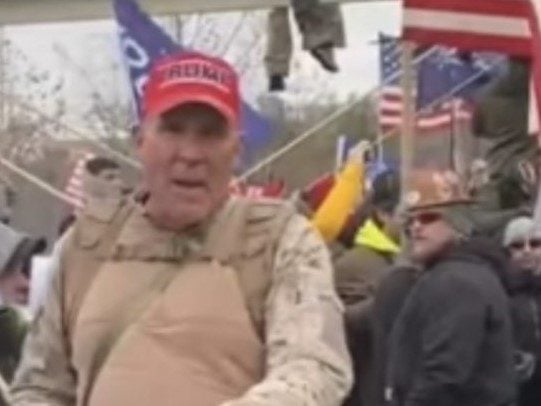

Infamous January 6 instigator Ray Epps was listed as #16 on the FBI Most Wanted List for a few days after the January 6, 2021 protests until he was removed from the list.
Epps led the charge on the US Capitol and was up front when protesters broke through two bike rack barriers. And it was Ray Epps who pushed a giant MAGA sign at police, a crime that sent at least eight protesters to prison for several years.
Yet, Ray Epps was quickly removed from the FBI Most Wanted List for some reason. We still have no idea why the FBI did this.
Current FBI Director Kash Patel spoke about this oddity on Timcast back in 2023.
Kash Patel: I think as a former federal prosecutor and a public defender who defended a lot of these types of cases, what you need to show is whether or not the FBI and government agents were using undercover operatives and informants on the day of January 6th, because if you can show that, you know they’ve been at… Hang on.
But the paperwork shows having run informants, that’s a six-month buildup. Minimum. It’s not like they just dropped them into the Proud Boys and said, Hey, don’t disrupt, please. Once you prove that, then you defeat the insurrection narrative with the FBI’s own documentation, forget what the videotape shows…
…I’m not saying I know definitively. What I’m saying is a reasonable suspicion is that there were agents, there’s a video showing a guy with an earpiece pulling people into the building. All You combine that with the evidence of Ray Epps, and it looks like you have a preponderance of evidence suggesting there may have been federal law enforcement involved in making that thing happen…
…I’ll get you beyond a reasonable doubt. Two pieces of information. Ray Epps was on FBI’s most wanted list one day, and the next day, he was off of the FBI’s most wanted list.
There are only two ways that happens. You die or you’re an informant. Put that aside. Under Congressional testimony, Jill Sanborn, who I used to work with, the head of the FBI counterintelligence division in charge of all these investigations, testified under oath when Senator Cruz asked her flat out, were there federal agents involved with January sixth?
She said, Senator, I can’t answer that at this time. If the answer was definitive no, having been a DOJ FBI guy myself, she would have gone there and said, No, absolutely not. The reason she said, I can’t answer that is because of the same stonewalling they gave us during Russiagate with Christopher Steele, Halper and everybody else. It’s the same narrative, and I’m telling you they were there.
Kash Patel: “Ray Epps was on FBI’s most wanted list one day, and the next day he was off. There are only two ways that happens: you die, or you are an informant.”
pic.twitter.com/UZFrKobUdI
— Alex Bruesewitz (@alexbruesewitz) March 9, 2023
We still don’t know why Ray Epps was removed from the FBI’s Most Wanted List.
Last Wednesday, investigative journalist Yehuda Miller, on behalf of The Gateway Pundit, made a FOIA request from the Department of Justice for any and all information regarding Ray Epps and January 6, including all communications and directives relating to the removal of Ray Epps from the wanted list.
We also requested all communications between the FBI and Ray Epps from Jan 1, 2020, through Jan 1, 2025, and all files, records, and communications relating to Ray Epps from Jan 1, 2020, through Jan 1, 2025.

On Thursday, we received a response to our FOIA request on Ray Epps.
The FBI rejected the FOIA request, saying, “While the existence of FBI records is acknowledged, the records are exempt from disclosure as processing these third-party records would constitute an unwarranted invasion of personal privacy.”
What is that supposed to mean? They have the records, but releasing them may be “an invasion of Ray Epps’ personal privacy?”
“The FBI has completed its search for records subject to the FOIA that are responsive to your request. The records on third party individuals) you requested are categorically denied pursuant to FOIA exemptions (b)(6) and (b)(7)(C), 5 U.S.C. §§ 552 (b)(6) and (b)(7)(C). Please be advised that you have not sufficiently demonstrated that the public’s interest in disclosure (relating to the operations and activities of the government) outweigh the personal privacy interests of these individual(s). While the existence of FBI records is acknowledged, the records are exempt from disclosure as processing these third-party records would constitute an unwarranted invasion of personal privacy. As a result, your request is closed.”

As we looked further into this FOIA response, on page 4, the FBI explains that the documents were denied because, according to (b)(6), “personnel and medical files and similar files the disclosure of which would constitute a clearly unwarranted invasion of privacy.”
This is a ridiculous excuse to deny these documents to the public. Of course, the public has a right to know who Ray Epps was working with and what the FBI knew about his role on January 6. They just don’t want to disclose this.
We will continue to pursue these documents, as Americans deserve to see this information. Apparently, the FBI is worried that someone will be hurt if the documents are released. They are likely talking about the FBI.
Here is the full response from the Federal Bureau of Investigation.
The post FBI Responds to Yehuda Miller and The Gateway Pundit’s FOIA Request on Ray Epps — and It Only Raises More Questions appeared first on The Gateway Pundit.

